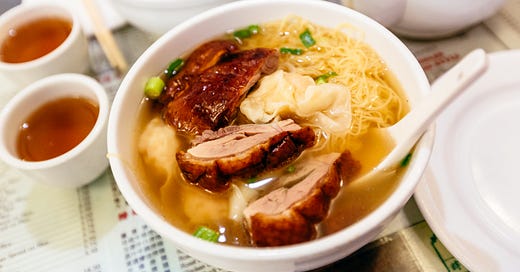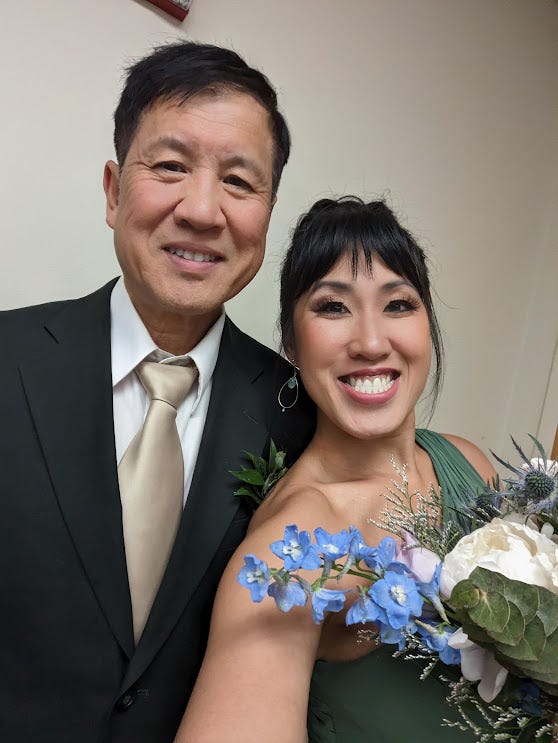Roast Duck Soup for the Chinese-American Daughter’s Soul
Food writer Su-Jit Lin contemplates the role of a favorite dish in her relationship with her immigrant chef father.
No matter the culture, no matter the upbringing, certain foods will always bring back certain memories. Whether those recollections are good or bad, the strength of the association is such that time stands still. For that one big moment, as you inhale the aroma, settle your teeth down, and let the flavors fill your mouth, you are again who you once were.
For me, that one dish was Hong Kong-style roast duck soup from Chinatown in New York City. To this day, its heat and fragrant spices remain strong enough to work their ways through my sinuses to permeate my subconscious.
***
Imagine this: chopped duck, dark and gamey, marrow unobtrusively seeping out of brittle, splintered bone. Rich meat covered in crackling skins, shining with fat rendered out, and glistening with that which remains. A complex broth gleaming golden, tasting faintly of toasted shallots and green onions. From this, steam rising to coat your nasal passages with delectable, moist warmth as the scent travels down to your mouth. Al dente egg noodles, floating like dense bundles of seaweed in a virtual seascape, with plump ground pork-and-shrimp wontons wrapped in translucent skins, the excess dough fluttering in the soup like the tails of fat jellyfish.
Atop it all, tender baby bok choy, Chinese broccoli, or crisp mung bean sprouts to add a splash of color and a refreshing, vegetative foundation to the heavy flavors. Despite how much my tastes evolve or my standards rise, this will forever be the dish that transforms me again and again, back into a buck-toothed child eagerly grinning at a bowl bigger than her head.
***
Coming from an underprivileged family in the restaurant industry, I learned early on in life that although cash may change hands, food is the ultimate currency. Greens hold more value than greenbacks, and bringing home the bacon wasn’t a figure of speech — it’s what my parents literally did. Although we were disadvantaged, because of my parents’ profession, food was always plentiful. In our house, money wasn’t used to coerce us to do the right thing, but tasty treats were always fair game.
I first realized food could be used transactionally the year I was 7, when it became apparent that natural selection hadn’t done its work. Although I had my father’s thick, shiny hair, I unfortunately inherited my mother’s stubborn, crooked teeth. The roots of my little baby teeth were firmly entrenched in gums with a Krazy Glue-like core. My parents tried every trick in the book, from tying them with floss to a doorknob and pulling them, red-faced, to having me chew hard candy. Ultimately, some of them simply demanded white-glove treatment: the dreaded dentist.
Since my parents struggled to maintain their own business, they couldn’t easily afford health and dental insurance. Seeking the cutthroat bargain rates of Chinatown, my dad took as his responsibility trips from our home in Suffolk County, Long Island to a dentist there, where cash was king and everything was negotiable.
It was a struggle for my father to get me there. Threatening me with punishment resulted in kicks, screams, and frantic tears that dried on my cheeks in salty rivulets. It was as much of an ordeal for my parents as it was for me — until my father stumbled upon the one thing he could bribe me with: soup. My parents discovered that nothing quieted down an angry, sobbing, newly-gap-toothed child like a big bowl of slightly cooled soup with tender duck morsels slowly congealing into eggy noodles.
Imagine this: chopped duck, dark and gamey; marrow unobtrusively seeping out of brittle, splintered bone. Rich meat covered in crackling skins…
This relationship with roast duck soup grew stronger and more meaningful as I grew older. It became a tradition for the rare solitary days spent with my often-elusive father. The once bright-eyed youth who had come to the States with dreams of becoming a physicist instead found himself constantly stuck at the restaurant he struggled to maintain, trapped behind lines of hot cauldrons filled with pork shoulder and chicken stock, open gas flames, and industrial broilers.
Less visible was the psychological burden of patronizing racism that kept him from being seen for the intelligent man he was. He stuffed his pride down daily as he patiently served the intolerant. He smiled benignly through secretly gritted teeth as he was shaken down, scammed, and treated like a second-class citizen instead of an entrepreneur. He chuckled good-naturedly even as he stomached insulting jokes uttered by the ignorant.
But still, he worked ceaselessly to keep the business afloat so that his children could be all that he had hoped he could have been in the New World. In fact, he worked so hard that for us kids, vying for his attention at the restaurant was a lost cause.
And so we didn’t.
My siblings and I were expected to pitch in, our sweat equity a deposit toward the future college tuition payments my dad hoped to make. In an atmosphere that was lacking in fun and mental stimulation, dinner — eaten in shifts, but fresh and plentiful and accompanied by escapes into fiction as we read through our meals — was the highlight of every evening spent in the restaurant after school.
The tedium lifted though, when we escaped to run errands. It was a no-brainer to volunteer to accompany my father on jaunts to New York City, whether the task at hand was as mundane as picking up menus; unappealing as examining empty-eyed sea bass; or uncomfortable as sitting on a pile of boxes under the glare of buzzing fluorescent lights in an old, cluttered supply store as he selected new woks.
Coming from an underprivileged family in the restaurant industry, I learned early on in life that although cash may change hands, food was the ultimate currency.
It was always worth it, no matter the trip’s purpose, for a bowl of hot soup in a crowded, noisy shop on Mott Street and the unfettered attention of my father — a man who’d immigrated from son-hungry China to father a houseful of daughters; a man who liked to poke fun at his beloved wife with a twinkle in his eye; an educated man also weighted down by dashed dreams and bitter disappointment in what real life had turned out to be in America.
It was only during the length of our meals and the satiated drives back over the rickety Williamsburg Bridge that he wasn’t my dad, but this man. He became a person, one who laughed easily, listened attentively, and had hopes and dreams for his girls — all three of them.
But during that time, I was the special one. Not just the eldest, but the chosen first mate, the figurative son of the family. After these special outings, the remnants of our lunch would come home with us in a plastic container in a little brown bag clasped to my chest, close to my heart. And no matter how much my sisters would wheedle and whine, it was mine, this afternoon with Dad condensed into a few scraggly pieces of fatty meat and soggy noodles.
Times, however, got hard. As competition and increased and business dissipated, these afternoons together became more rare.
They ended entirely when I was in seventh grade. The last excursion involved a dinner-sized bowl after a terrifying wintry evening at the dentist, as the final tooth was pulled to make room for my impending braces. Cotton wadded in my bleeding mouth, our faces tight against the icy blasts of dirty air, we struggled that night to find a noodle shop that was open. But a promise was a promise, and my father was determined to make good on his word.
I’d been ready to call it quits after we searched for about an hour. Then my dad finally hustled me and my aching mouth into a warm, raucous little shop in God-knows-what part of lower Manhattan. I wasn’t in the mood, but, still, I ate, accepting my father’s wordless apology for 90 pliers-and-blood-filled minutes in the dentist’s chair.
My parents discovered that nothing quieted down an angry, sobbing, newly gap-toothed child like a big bowl of slightly cooled soup with tender duck morsels slowly congealing into eggy noodles.
He wasn’t an emotional man and still isn’t, but I was old enough to know that the tunnel-vision focus he displayed just to find my favorite dish meant more than it seemed. I was still his right-hand girl.
***
As I got older, I found my rebellious streak, and — as minority children in a majority neighborhood are wont to do — developed embarrassment for my ethnicity. I distanced myself from everything that tied me to it. I turned my back on the foods that had defined my days as good or bad, and all of the connotations each plate held.
Afternoons with Dad were no longer a precious commodity. Instead, I hid my face in shame when I heard his accented English and his loud joking with gold-toothed men with scraggly mustaches.
I was no longer proud to walk around with him in his work-stained favorite Dockers and puffy no-name winter coat that let out a whiff of garlic and soy from the sauces he made from scratch every day, smells that had been absorbed permanently into the jacket’s filler.
In turn, he was no longer proud to have his “whitewashed” sulky daughter accompany him on errands she now looked down upon with disdain.
My teen years were filled with resentments on both sides, and roast duck soup became a forgotten tradition. As I broke away from the family, refusing to work at our restaurant, and fell in with an unruly crowd, my father lost his connection with me and I with him. In my rejection of my heritage, I progressed backwards palate-wise, going from eating escargot with enthusiasm to cringing at the sight of a whole fish. I began to see the delicacies my dad used to prepare for us as provincial or crude, especially next to comforting basics like a chicken cutlet sandwich from the local deli, or fast food burgers.
Not being old enough yet to realize what qualified food as “gourmet,” I saw luxury items like abalone, tripe, and offal as plain weird, too different from what my friends’ parents made in their all-American suburban kitchens.
In fact, after other kids expressed disgust when I mentioned eating duck, I almost forgot how much I loved it. Until I “ran away.”
***
I can’t even recall what our fight was about. One day toward the end of high school, I stormed out of the house in anger at my father, running over decorative shrubbery in my haste to get the hell out of dodge in my passed-down Honda. I drove at near-reckless speeds, gulping down sobs of frustration, and made my way to my boyfriend’s, refusing to answer my dad’s angry threats and messages on my cell phone’s voicemail. Out of pure spite, I gave my mother only cryptic answers to her tearful pleadings to tell her where I was.
I told her I would never speak to my father again, that we were done and that I was out for good since I was starting college soon, anyway.
I had no doubt I’d never receive an apology from him. My father was a proud man whom I’d never heard say the words “love” or “sorry.” So I played at this war for one day, two, then three, forwarding calls from my father’s number to voicemail, and hanging up when I heard his recorded voice, only answering calls from my mom. She figured this out and ambushed me on the fourth day, handing the phone off to my dad, begging as she did so for me to not hang up on him.
His voice was gruff. “I hope you’re not hungry,” he said.
“No,” I replied, polite but cold.
“Well, I went to the city today,” he said tentatively. “I brought home some roast duck soup. I hope you’ll come by and eat it.”
I can’t even recall what our fight was about. One day, for some reason, I stormed out of the house in anger at my father running over decorative shrubbery in my haste in my passed-down Honda.
I felt the moment freeze as my heart stopped, jolted by what was meant yet remained unsaid. Suddenly, I was a child once more, a little girl with stubborn milk teeth in a poofy dress and patent leather shoes. Another second and I was a buck-toothed preteen again; I could almost feel the thick fringe of black bangs on my forehead, the scratch of braces against the insides of my lips.
With the memory of roast duck soup in my heart, the frosty feelings I’d been petulantly holding onto began melting away.
A moment’s pause, a deep breath. “Okay,” I answered, my voice shaky.
And like that, two pig-headed people, more similar than either of us would have liked to admit, came to understand one another again through the sharing of food, recipes, and more food.
This became especially meaningful a few years later when I moved from New York to New Orleans, as the balance was gradually and consciously restored.
***
When I was a child, Chinatown in the afternoon led to roast duck soup. When I was a college student, visits home yielded the same result. Today, during occasional long drives in his minivan, with me sitting shotgun, we enjoy the same camaraderie we shared in the clunky bench seats of his Buick decades before.
In the wake of our reconnection, I’ve gained a full awareness of just how much every steaming spoonful of noodles, wontons, duck, and bok choy has really meant. I also came to know for sure that even though it was never spoken aloud, I was and will always be my father’s right-hand girl, the eldest daughter, and (even though a little brother finally arrived on the scene), the first “son.”
When I lived in New Orleans, I searched for roast duck soup substitutes in the Vietnamese cuisine of that city as a way to feel close to my aging father, who was still cooking and laughing his hearty guffaws in his kitchen in New York. Every bite brought me a step closer to home; every slurp poignant, inducing peace, pleasure, and a little bit of sorrow for the time wasted during our rift.
I’m proud of my origins now, to tell people I was raised in a commercial kitchen.
As I’ve gotten older, I’ve gained a greater appreciation for food and the act of cooking. I find that the more luxurious a meal, the more important the relationship between myself and the person providing it seems. The effort put into every nuance is an act of love, deeper and more meaningful than words alone. The precision of a dice, the perfection of a julienne, the longer the braise — these are all symbols of care.
And as I develop as a food writer, it seems that the more exotic the dish, the greater the association with my father, the man who taught me never to fear trying something new and unpronounceable.
In fact, I owe my current writing career and early culinary education to this background and the epicurean adventures my dad used to take me on — starting with roast duck soup.









Wonderful story, wonderful memories .......
at almost 80 yrs old i’m still amazed at how re-experiencing a food or food event of our youth/childhood can literally make you 6 years old again. You smell it, feel it, taste it and have the sense of living it again. You are THERE like some weird form of time-travel
No matter the food, the culture, the family, there is a story like this.
Mine is about an unapproachable and unknowable Dad who got up early every Saturday morning to be first in line for freshly fried donuts for my 3 sisters. Because he knew I didn't like the sticky sweetness of donuts and they didn't like cheesecake, he brought me a single-loaf lemon chiffon cheesecake. Light as air and the colour of pale whipped egg yolks, I was convinced it contained no calories. Skinny as long legged colt at the point in life, I didn't worry about weight gain nor worry about competition in a household of hungry kids.
It wasn't until later, in my snarly teen years, that I began to watch my weight and resent my dad for forcing me to eat an offering that signified his love for me, and sadly, because he did love me, he stopped bringing that treat home at my request. I'm still a sucker for cheesecake, and still don't eat donuts but they instantly transport me to my childhood. Thanks for reawakening those memories with your beautiful story. Hug your dad while you can.